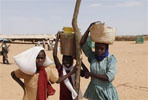
On the heels of incriminating evidence of the U.N.’s inability to protect civilians in Congo, news of violent clashes in Darfur over the weekend left U.N. peacekeepers again looking at best ineffectual and at worst complicit in government efforts to downplay the ongoing humanitarian crisis that is now in its seventh year.
Though details and mortality figures are sketchy and difficult to confirm, reports indicate that this latest surge of violence began on Thursday in a market in the town of Tabarat, in North Darfur. According to one leader in the rebel Sudan Liberation Army, a government-sponsored group staged the attack, “firing indiscriminately at shoppers,” and then attempted to cover up the extent of the violence by hauling away bodies in a truck. The death toll could be as high as 80, but U.N. peacekeepers – who didn’t arrive at the market until Saturday – confirmed 37 dead and 30 injured.
Sudan expert Eric Reeves obtained an internal U.N. report on the attack at Tabarat market that indicated peacekeepers were located just 15 miles away in a town called Tawilla. Despite the immediacy of the need for civilian protection, the U.N. forces were apparently awaiting approval for an intervention from force leaders in El Fasher, Reeves reported, who in turn were awaiting permission from the Sudanese government – even though government proxies were reportedly carrying out the attack.
Meanwhile in West Darfur, fighting broke out in the restive Hamadiya IDP camp on Friday night. A U.N. spokesperson initially said it was unclear what caused the violence, but Radio Dabanga described ties to incidents in July over the stalled Darfur peace process. Citing unnamed sources from aid organizations, Radio Dabanga reported that aid groups had received threats earlier in the week from a group backed by the Sudanese government. The group, which included some of the individuals expelled from the camp during the earlier incident, warned it would attack the camp if U.N. peacekeepers did not hand over those allegedly responsible for the three deaths that occurred in July. “Sources said that the elders of the displaced camp warned UNAMID that they expected at any time an imminent attack by this group backed by the government,” Radio Dabanga reported.
As with the recent attacks against civilians in eastern Congo, which unfolded in the vicinity of U.N. peacekeepers and with at least some U.N. awareness, discussion of the weekend violence in Darfur has focused largely on the failings of its peacekeepers – rather than on the perpetrators of the violence. Certainly this criticism is warranted. In his impassioned post for Dissent magazine on the complicity of the U.N. in efforts to brush aside Darfur, Eric Reeves describes through numerous examples how typical sources for reliable information on the suffering of Darfuris have gradually dried up, sometimes through direct action from the Sudanese government, but oftentimes through self-censorship, even among the highest U.N. officials charged with reporting.
Of course, UNAMID has chosen to limit its reporting, but this decision stems from concern that the Sudanese government can simply expel peacekeepers if it is displeased. This tenuous relationship creates a dilemma for UNAMID, but ultimately, in order to have the international backing UNAMID needs to pressure the Sudanese government to loosen its restrictions on movement and thus increase the force’s ability to respond to outbreaks of violence, UNAMID needs to be upfront about the conditions it is facing on the ground.
I’m reminded of a passage I recently read in Samantha Power’s book about the highly esteemed U.N. diplomat, the late Sergio Vieira de Mello. Faced with a quickly deteriorating security situation in Indonesian-occupied East Timor, and with U.N. Security Council members dragging their feet on what to do, Vieira de Mello said to his team in the war-torn would-be country, “If we learned anything in the last five years, it is that we have to stop telling the Security Council what it wants to know, and instead tell it what it needs to know. (…) We can’t censor ourselves.” Despite the brutality of the Indonesian troops in East Timor, countries were accepting Indonesia’s pledge to secure East Timor. “Should we not be skeptical in this regard?” Vieira de Mello wrote to colleagues at the time.
He was well aware that the recommendation from his team on the ground (in this case, supporting intervention by a contingent of Australian peacekeepers) would not be popular among Security Council members, but he felt strongly that this was the best option for alleviating suffering of East Timorese. “[If] we wish to avoid being a scapegoat, we should put the onus of rejecting solutions on others,” Vieira de Mello wrote at the time.
The U.N. peacekeeping chief in Darfur may have recently expressed support for a Sudanese government strategy to relocate Darfur’s displaced people and begin closing camps (a proposal rife with problems, as we have noted before), but the peacekeeping mission must reclaim its ability to report honestly about the constraints it faces in Darfur, many of which fall to the Sudanese government.
To be sure, the U.N. peacekeeping mission has fallen short time and again in its responsibility to protect civilians. But from its unique vantage point, operating day in and day out on the ground in Darfur, the U.N. peacekeeping mission should be far more outspoken about why, for instance, it was unable to respond quickly to outbreaks of violence this weekend. Acknowledging the extent of government interference – which is typically only hinted at in official U.N. statements – may have an effect on influencing just how much trust the international community places in the Sudanese government to find a solution in the interest of Darfuri survivors.
Photo: Children in an IDP camp in Darfur (AP)

